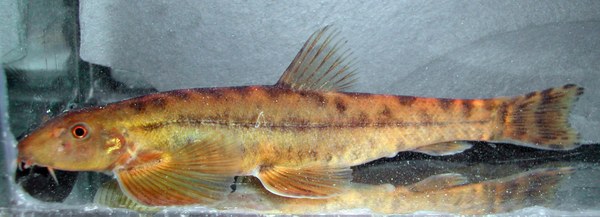Homaloptera gymnogaster
Summary
Common name: Lizard Loach, Lizard Fish
Synonyms: Homaloptera modiglianii, Homaloptera modigliani, Homaloptera amphisquamata, Homaloptera lepidogaster
Distribution: Sumatra, Indonesia
Sexual Dimorphism: Females probably plumper in healthy, well-fed fish.
Maximum size: 3 inches (7.5 cm)
Similar to: Other Homaloptera

Care: Inhabit fast flowing streams over boulders, often in forested areas. Aquarium should duplicate these conditions, including high water flow, as these fish have very high oxygen requirements.
See: Hillstream Loaches: The Specialists at Life in the Fast Lane for more detailed explanation.
Homaloptera species require similar conditions to other Hillstream species. All need excellent water-flow and aeration, numerous rocky hiding places and smooth pebbles and boulders to graze over. Lighting should be bright to encourage algal growth in the aquarium. Plants are not necessary as the fish do not normally encounter them in the wild, but they will help with water-quality. Suitable plants for high-flow environments are Anubias and Microsoreum. These will grow on rockwork or driftwood.
 Feeding: Good quality flake, sinking pellets, algae wafers, thawed frozen Bloodworm, Mysis Shrimp, natural algae an advantage.
Feeding: Good quality flake, sinking pellets, algae wafers, thawed frozen Bloodworm, Mysis Shrimp, natural algae an advantage. Water parameters: pH: 6.5-7.5 Hardness: Medium Soft to Medium Max dh: 12
Temperature: 70ºF to 78ºF (21-25.5°C)
Breeding: Not bred in aquaria.
Notes:
 Protected, although widely distributed in hill streams of Sumatra. Unlikely to have been specifically exported for the aquarium trade, but possible the species may arrive mixed with other species.
Protected, although widely distributed in hill streams of Sumatra. Unlikely to have been specifically exported for the aquarium trade, but possible the species may arrive mixed with other species.
Probably best kept in groups of their own kind, but should also mix well with other Hillstream type loaches.
This species has remarkable color changes abilities, which no doubt aid the fish in camouflaging itself.
Photo Gallery
Click to view all images of this species! |
Document Actions

